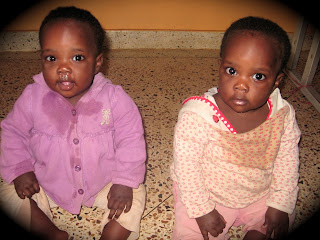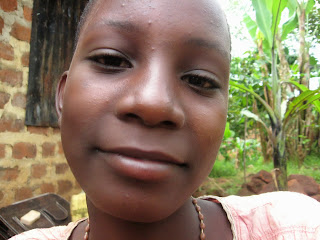Eva caught my eye even before she came to talk to me on
Friday. The first time I saw her was at the first primary school assembly I
attended a week after arriving here. During presentations, one girl who was
taller and looked considerably older than the others got up and sang two songs.
I couldn’t hear a word she said because most of the students were talking amongst
themselves and I was standing in the back, but she didn’t seem to care that
people weren’t paying attention. When she finished, the next group got up and I
didn’t give her presentation another thought.
The second time I saw her was only a day or two later. Bob,
Kendall and I were going on our first walk down the road outside Noah’s Ark. As
we were rounding a bend, we heard someone yell “Aunties!” from a nearby field
and looked over to see a young woman half-running toward us, a small child on
her hip. She arrived with a huge smile on her face, which I soon came to learn
is a nearly permanent fixture there. We introduced ourselves, not recognizing
her until she told us she attends New Horizon, the school at Noah’s Ark.
Kendall recognized her right away from the presentation. It took me about
fifteen minutes to make the connection. Apparently her initial impression on me was
not the strongest.
Since then, however, I have come to notice and admire her
very much. Every week at assembly, she presents one or two songs by herself.
They are always in Luganda so I have no idea what she is saying, but that
doesn’t keep me from loving her performances. Last week, the drummers joined in
and she spent as much time dancing as she did singing, skipping around the
stage with her face lifted upward.
She is often in the group that leads praise and worship as
well, always the tallest one among the younger students. I have been meaning to
tell her for weeks what a great leader she is and how much fun it is to watch her
sing.
But the time I love watching her most is not when she is
doing a presentation or leading praise and worship. It is when she is in the
back, worshipping with all her heart even when she knows no one is watching (or
thinks no one is watching). She sings along to all the songs. She dances when
no one else is dancing. She nudges the people next to her, urging them to move
too.
Eva has a beautiful heart and God has filled her with the
joy I hoped I would see here.
I have had her in my English class a few times in the last
month, and we have developed a friendly acquaintance. After class on Friday
morning, as the other students were leaving, she stayed in her seat and quietly
asked if she could talk to me. I sat down beside her.
“I was wondering… if you could help me,” she said, not
meeting my eye. “My family and I… we need clothes. And we don’t have the money
to buy them. I was wondering if you could give us any clothes.”
I had no idea what I expected her to say when we sat down, but
I wasn’t totally prepared for this. I hesitated. Should I really be going
around giving handouts? But my hesitation only lasted a moment because then I
looked at Eva, at this teenage girl who sat humbly before me, asking but not
expecting. This was a need right in front of me, and how could I possibly say
no to her? I told her I would bring something to one of our next classes and
she left as new students filed in.
The next day at school, Eva approached me again, a shy smile
back on her face.
“Auntie Katie,” she said, “I want to tell you my story so
you know why we are in need.” We sat down on a step in the sun and waited for
her classmates to file back into the classroom before she started.
“So, my clan… Do you know what I mean when I say clan?” I
nodded. “Well, my clan… is no more. I buried my father when I was seven and my
mother died when I was ten, but I did not bury her. I did not bury my mother.
At the end of second term, I was called out of school because both of my
grandfathers died. I went into the village to bury them. My mother’s brothers
and sisters have all died and my father’s brothers and sisters have all died.
There are eight children left by them, including me and my sister. She is in P3
here. We live with our grandmother, but she is old and needs us to care for
her. We have no way of getting food and clothes. We are used to it though. We
are used to going two weeks, three weeks without food. But we are in great
need.”
I can’t say much of what she said surprised me. Unfortunately,
there are lots and lots of similar clans in Uganda. It’s awful. Some children
have to grow up so fast. We exclaim when a 15-year-old gets her driving permit.
“She’s growing up too fast!” we affectionately sigh, or sometimes sob. But what
about the 15-year-old girl who must become a mother of seven while working hard
to stay in school to secure a better future for herself and her family?
“Many people ask me why I don’t get married to get help,”
Eva told me. “That way, my husband could provide and we would be better off.
But me… I don’t want that. That is not for me. I want to finish school; I
cannot get married now.”
I commended her for her determination in school and told her
how much I love watching her sing and dance at assemblies. “God has given you
such joy, Eva, and I can see that. Everyone can see that! Now that I know what
you are going through I am even more amazed and thankful for the great joy he
has put in your heart.”
“I have to have joy,” she said. “Otherwise I would have
nothing.”
Oh this beautiful, humble girl who can dance with joy while
her stomach is growling.
After talking a bit more, she let me pray for her and then I
gave her a small amount of money to get them through the weekend, assuring her
I would have something else for her on Monday. She hugged me and thanked me
with her mouth and her eyes, and then went back to class.
Over the weekend, I gathered a few more things for her. One
skirt, a shirt, a bag of sugar and a very small jar of peanut butter were some
things I had on hand that I was sure she could use. I put it all in a black
plastic bag, along with some money so they could buy food and clothes for the
next week. This morning at school, Eva sought me out again and I handed her the
bag.
“It’s not much, but it should help for this week and I will
have more for you next Monday,” I said.
This time her grin was not shy. She looked thrilled.
“Oh Auntie Katie, thank you so much! Thank you, thank you,
thank you,” she said, looking in the bag. “Oh, you say this is not much, but
this is so much to us. My grandmother was so excited on Saturday and said for
me to tell you thank you. She was very, very happy.” Eva hugged me no less than
three times before leaving the library with a spring in her step.
I have no idea what I will bring for her next Monday, but I
would hand her a bag of just about anything to see her face light up like that
again.
I tell you this not to paint a picture of me as a selfless,
generous giver—trust me, what I gave compared to what I have is pitiful—but
because Eva has touched my heart and I want you to know this young woman who
trusts in the Lord with all her might and has possibly done the best job in the
world of showing me what true joy looks like. I will only be here for six more
weeks, which most likely marks the end of the time I can physically help her,
but my prayer is that something or someone comes along who can help her family
make ends meet until the time Eva is able to do so herself. Please keep this
strong, precious girl in your prayers as well.
p.s. I have changed her name
for the purposes of this story. Just in case anyone reads this who will serve
at Noah’s Ark in the future, I don’t want Eva to feel belittled or betrayed by
the fact that I told people she asked me for money.



















